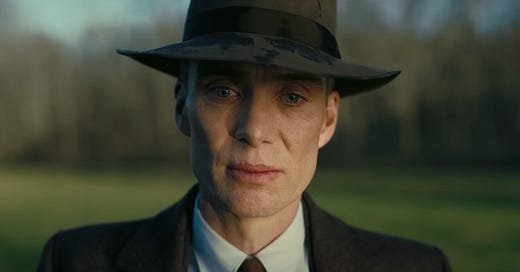OPPENHEIMER: The Great Man Biopic
Now on home video, Christopher Nolan's epic comments on a tired genre
I have a love-hate relationship with biopics. I enjoy them to some degree, but a lot of them follow a formula. A compelling performance, a thoughtful script, and some visual flair can make a biopic good. The worst kind of biopic are the ones that feel like reading a Wikipedia entry, with perfunctory nods to important events. They feel like checkboxes and feel devoid of personality or purpose beyond scoring a few awards. Christoper Nolan’s OPPENHEIMER is probably my favorite movie of the year so far, and to me feels like a refreshing take on a specific kind of biopic: the Great Man Biopic.
The first hour of OPPENHEIMER plays like a standard biopic on overdrive. We’re introduced to so many characters in rapid succession, years fly by in seconds, and the editing is dizzying. The film features moments in Oppenheimer’s life that feel like what you might see in a more conventional movie. He gives a speech in a foreign language. He flirts with communism, and sexy communist women. He unionizes professors. The first third of the movie could be its own movie. Nolan and editor Jennifer Lame play this like a trailer. It’s a really fascinating filmmaking choice, to condense so much in a short amount of time and present in extremely brief scenes.
For me, this accomplishes two things. One, it allows for the film to slow down at Los Alamos as Oppenheimer starts to build the atom bomb. It’s all a rush getting to the middle third where we then spend Two, it feels like a satire of commentary on how some biopics feel so rushed. Movies like BOHEMIAN RHAPSODY just jump from Important Event to Important Event, often feeling like obligations more than explorations of someone’s life. They just feel like extended trailers, with no room for actually diving deep into the life.
Here, Nolan is literally giving OPPENHEIMER the trailer treatment, and I think it’s because the film is so directly from Oppenheimer’s perspective and he sees his life in short clips leading up to the greatest and most devastating era of his life. Nolan in interviews says that the color parts of the film are subjective to Oppenheimer’s POV and the black and white are objective. And the framing of the color portion present Oppenheimer as a biopic might, while in the black and white portion he is presented with distrust and skeptcism. There’s a scene in Los Alamos showing Oppenheimer putting on his hat like a superhero putting on his cape. I don’t think that is Nolan indulging in superhero motif for this guy but rather showing that Oppenheimer sees himself as the most important man in history in building this impressive but horrific device.
After the bomb goes off, Nolan depicts Oppenheimer’s guilt as what he has done has finally caught up to him. One could almost see a version of this film where the audience is expected to feel sorry for dear Oppy: maybe he had noble intentions and was betrayed by the government or didn’t really fathom the expansive repercussions. All of this would be disingenuous and quite irresponsible as a filmmaking choice. Bit it’s an easy one for filmmakers to take when tasked with a troubled protagonist.
I love the first hour of OPPENHEIMER; the whiplash editing is symphonic and exhilarating. It’s what Oppenheimer would picture as his own biopic, especially as he tries to “let himself off the hook” later in the film or at least perform guilt in a way that almost works. Nolan takes what a bad biopic looks like and takes it to the extreme with a wild first hour that comments on generic biopics about difficult but powerful men. It’s a brilliant filmmaking choice, and solidifies OPPENHEIMER as a major film of the year 2023.




